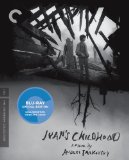| Reviews & Columns |
|
Reviews DVD TV on DVD Blu-ray 4K UHD International DVDs In Theaters Reviews by Studio Video Games Features Collector Series DVDs Easter Egg Database Interviews DVD Talk Radio Feature Articles Columns Anime Talk DVD Savant Horror DVDs The M.O.D. Squad Art House HD Talk Silent DVD
|
DVD Talk Forum |
|
|
| Resources |
|
DVD Price Search Customer Service #'s RCE Info Links |
|
Columns
|
|
|
Ivan's Childhood: The Criterion Collection
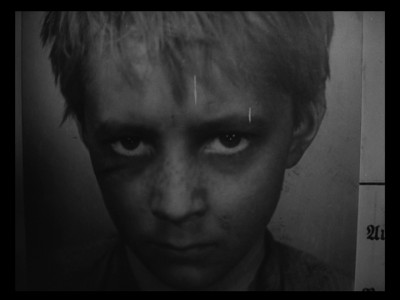
Please Note: The screen grabs used here are from the standard-definition 2007 release, not the Blu-ray edition under review.
To call Andrei Tarkovsky's 1962 debut feature, Ivan's Childhood, a "transitional" film implies something more compromised and less accomplished than it actually is. But for a filmmaker who grew into the singular artistic force that Tarkovsky became five years later with (only) his second film, Andrei Rublev, even something that works as well, and often as flat-out brilliantly, as Ivan's Childhood looks like the beginning, the not-all-the-way-there first step, to those whose conception of what cinema can do and be has been exploded by the subsequent films -- from Rublev to The Mirror to The Sacrifice -- that find Tarkovsky unmooring himself from virtually all convention and coming gloriously into his own. But what an auspicious beginning, what a bold and trailblazing first step his first outing was. An adaptation of (co-screenwriter) Vladimir Bogomolov's story "Ivan," the film was already well into production under another director when it was deemed a failure and the doors opened for Tarkovsky, scion of a cultivated Russian family and a film student with an acclaimed short (The Steamroller and the Violin) under his belt, to come in and remake it in the image of his own themes, motifs, and poetic sensibilities, and despite its much closer adherence to a conventional story and narrative structure than was ever seen from Tarkovsky again, it's deeply marked by his already patient, gracefully elaborate, exquisitely sensitive camera eye, rendering it an extraordinary experience, a story whose latent stores of fierce emotion are opened up wide by frequent stretches of the kind of visual and aural sublimity that would later become synonymous with the director's name.
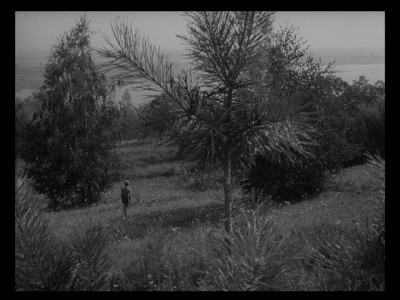
It certainly must have helped that the story is such an intensely personal one, as it would be for any Russian (who wouldn't have had to have actually fought in World War II to know that this proud land experienced, on its own soil, a suffering and bloodshed not approximated in the American or even in the British experience), and as it was for Tarkovsky specifically, who, like the film's protagonist, was a preteen during wartime; one wonders to what extent Tarkovsky drew upon his own most precious memories of childhood carefreeness and security, or his own traumatic experience of the sudden, violent disappearance of those qualities, when conceiving the childhood referred to be the title and conveyed to us by the film. We first meet Ivan (Nikolai Burlyaev) in a blissful mode of being, far away from the conflagrations, gunshots, and screams; the film opens on one of the dream-memories that form one plane of Ivan's existence as Tarkovsky has filmed it. Ivan's childhood before the war was a happily earthy experience, drawing water from the well with his mother, harvesting apples with the other children of his evidently rural/agricultural community, flirting and frolicking innocuously with a girl of around his same age, the both of them young, wild, and free enough to remain stripped to waist as they play hide and seek and chase each other down an endless stretch of beach, the suffusing sun making the vast ocean a sparkling, jewel-like backdrop for their un-self-conscious joy. (Tarkovsky-philes will note, with the pleasure only perfect, bookending symmetry can bring, that the film's opening crane shot -- one of many instances in this film and beyond where Tarkovsky's camera slides gracefully away from any human figures to take in nature or art -- slowly pulls back and up from Ivan to vertically track a tree that seems to be pointing our look toward the heavens, an identical image and camera movement to the last he ever gave us, the one with which he concluded The Sacrifice a quarter-century later.)
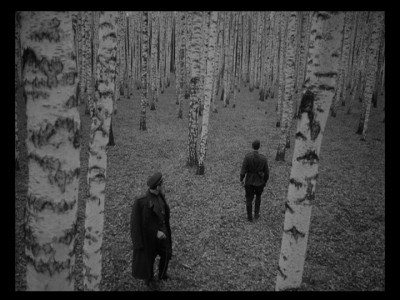
The film's other dimension, which constitutes the majority of what we see and hear (and which we're most often jarred back into, along with the startled-awake Ivan, from the sunlit dreams in an effective, Hitchcock-like way via abrupt blasts from Vyacheslav Ovchinnikov's otherwise more atmospheric, delicate score), is a stark contrast to the idyllic reminiscences, one that makes the film's cosmology a decidedly binary, heaven/hell one. Here, in his present reality, Ivan is a hardened, half-starved, bedraggled orphan, defiantly insisting to the military men who've been charged with his care by war-chaos default, that he be allowed to continue his work for the (anti-German) partisans and work for them as a conveniently stealthy (because small, thin, and lithe) scout doing reconnaissance behind enemy lines. Ivan wants vengeance for his murdered kin and comrades, and the officers' humane, conscientious attempts to get him out of the war and shipped back out of harm's way to a military school somewhere are ferociously countered by Ivan's threats (which he makes good on) to run away and fulfill his sense of duty and moral obligation regardless...so they have little choice but to let Ivan follow honor-bound, life-or-death inner imperatives with which no-one at his time of life should be on familiar terms.
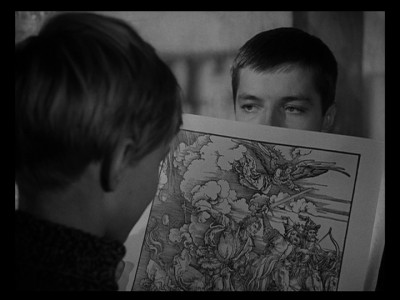
Tarkovsky similarly follows his own sense of artistic honor to the fullest extent the material and circumstances allow, using the incredibly fine, sensuously physical lighting and lensing of his perennial DP, Vadim Yusov (who would go on to work with Tarkovsky on Andrei Rublev and Solaris as well). The film's most recurrent, war-torn landscape is hell, alright, but it's a stark, heightened-reality, conscientiously aestheticized (but never trivializing), almost metaphysical-symbolic version of "war is hell" that would be possible only in a motion picture, specifically only in a motion picture by Andrei Tarkovsky, with smoke wafting over and through trees and the crucifix of a destroyed church; flares arcing up and down in the far background, a downed plane or the skeleton of a shelled-out dwelling dominating the lyrically composed frame, and -- most Tarkovskian of all -- always, even in this harsh, devastated landscape, the mitigating presence of the elemental. For Tarkovsky, capital-N Nature, the origin of all life human or otherwise, is always just a graceful pan or cut to wide shot away (there may exist the possibility of transcendence in urban environments, but definitely not to Tarkovsky's mind): Water, whether absorbing a gentle snowfall or reflecting mirror-like the aforementioned omnipresent flares, a surreptitious canoe outing across a lake's surface by Ivan and the soldiers, or Ivan's mother and her son's happy visages from the bottom of a well, is a constant presence; equally basic, life-giving forces like fire, sun, and the bounty of a harvest have a similarly strong claim on Tarkovsky's and Yusov's lingering camera eye. A scene that takes place in a striking birch forest is perhaps the surest flowering in Ivan's Childhood of what Tarkovsky's vision was well on its way to becoming: The tallness, whiteness, and uniformity of this almost painterly forest view seem to stretch off into eternity in Tarkovsky's uncannily beautiful way of composing it, while the camera's elaborate movements -- seeming to glide magically, in very long and elaborately choreographed takes, between impossibly narrow spaces between the narrow but densely clustered birch trunks as it captures the dangerous dance of a female medical officer and her male superior, then losing them both amid the trees, then re-finding them for a different framing, all without a cut or missing a beak (and all of this decades before there was such a thing as a Steadicam) -- create a slow, sure, elegantly kinetic and transfixing dance of actors, mise-en-scène, and camera in a breathtaking iteration of what would become Tarkovsky's trademark and mainstay, the mesmerizingly long, unbroken, gorgeous, and spellbinding take.
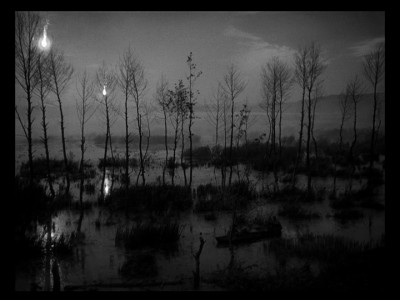
In the end, Tarkovsky generously and compassionately leaves us, along with poor, brave, doomed Ivan, in that heavenly cinematic space depicting Ivan's rightful childhood (as opposed to the one that life and human warlikeness have given him instead), where the aesthetic, the philosophical, the human, and the root of it all, Nature, flow together in a serene harmony -- a sacred place in Tarkovsky's conception, and one that he more than anyone else strove to legitimately and finely realize and impart through his cinema, both by making its elusive glory visible and almost tangible for the blessed viewer, and by contrasting it to the prosaic or horrific (the un or anti-natural, on Tarkovsky's implicit but clear terms) pitfalls of human existence, our wars and pettiness and mutually inflicted suffering -- the sins banishing us from the paradise we can only envision and realize through our art. Tarkovsky quite successfully gives both strategies a trial run with his debut long tournage, either recruiting or subverting the lesser exigencies of plot and character development to transform what could've been the film's much less remarkable war-movie proceedings into something frequently so ineffably mysterious, penetrating, and moving that only the world poetry suffices (setting, in the process, a template for a different, much less triumphalist and much more agonized Russian WWII film that his successors, for example Larisa Shepitko (The Ascent) and Klimov (Come and See) would later expound upon, powerfully.) It's not the fullest height of which Tarkovsky would prove himself capable over the rest of his astonishing, immortal filmography, but it's vital viewing nonetheless, for the newcomer to the great Russian master as a bridge between storytelling cinema and Tarkovskian cinematic poetics, and for the already-initiated, a compelling glimpse at what Tarkovsky's gift looked like as it emerged from the cocoon of more traditional narrative-storytelling film to give the world a first look at its rare, magnificently enigmatic, inimitably evocative and affecting colors.
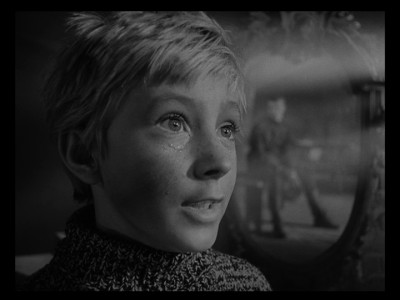
THE BLU-RAY DISC:
Presenting the film at an aspect ratio of 1.33:1 (a slight modification, or perhaps return to original shooting aspect ratio, from the original, theatrically-projected 1.37:1), the AVC/MPEG-4, 1080/24p transfer is gorgeous -- for a film with so many dark, very selectively and lowly lit scenes, the improvement over the standard-definition DVD is immediately and strikingly significant. Other than perhaps the faintest haloing/edge enhancement noticeable on a couple of occasions, the film looks fantastic as it's presented here: Blacks are solid, human figures and outlines are much more discernible in the barely-lit scenes than they were on previous home-video editions, and the contrast levels are just about perfect, widely variegated within the black-and-white palette, all with a healthy amount of film grain (no lazy catch-all digital noise reduction scrubbing has taken place) to keep the experience as warmly cinematic as it is free of compression artifacts or other visual flaws.
Sound:The film's original monaural soundtrack arrives on Blu as an impressively clear, resonant, yet utterly faithful uncompressed PCM track (in Russian with optional English subtitles). Every sound -- from the dialogue to the dripping or trickling of water to gunfire to Vyacheslav Ovchinnikov's sometimes startlingly abrupt score -- is rendered as vividly as the original (and perhaps more so than the sound of a well-traveled print), and is entirely free of distortions or imbalances.
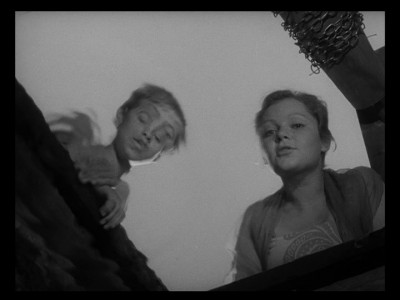
The new Blu-ray edition carries over to a T all of the supplements Criterion created for their 2007 DVD version, including:
--Life As a Dream, a half-hour interview, illustrated with clips from the film, with author, scholar, and Tarkovsky expert Vida T. Johnson, who goes into thorough detail in a conversational, accessible way about the historical circumstances of Tarkovsky's debut feature, the various biographical details that feed into Tarkovsky's approach and aesthetic, and, most interestingly, the ways in which Tarkovsky's films work in a poetic way, their recurrent themes and imagery, that could give any new viewer a great key to his films, and would makes for at least something of an eye-opener or interesting refresher even for more seasoned Tarkovskyites.
--Approximately 10 minutes of excerpts from an interview with lead actor Nikolai Burlyaev, who recounts the casting process in which Tarkovsky made him work hard and only much later revealed how impressed he was with his child star; a shoot during which he had to bring up real tears for the camera (aided by Tarkovsky's psychologically astute treatment of his actor and the director's gifts of multiple books on the horrors of the war); and his own intriguing, rather crackpot theories about Tarkovsky's death (of lung cancer, after defecting to the West in the early '80s; according to Burlyaev, who cites some scientific theory I've never heard of, Tarkovsky was a true patriot who couldn't stand forsaking his duty to his country, and "the lungs are governed by the sense of moral duty.")
--About 15 minutes' worth of segments from an interview with cinematographer Vadim Yusov, in which this artist of light and lensing gently but matter-of-factly recalls the working processes from script to screen on a Tarkovsky film, arriving at dreams and ways of looking at nature in the master's work, and the overall richness that continues to make them just as alluring, mysterious, and edifying to every subsequent generation of cinephiles.
--A beautifully designed (as is typical for a Criterion release) 30-page booklet featuring an incisive appreciation of the film by film professor Dina Iordanova; an "anti-manifesto" by Tarkovsky published in a Russian film journal around the time of Ivan's Childhood's release; and a 1958 poem with uncanny similarities to the film's imagery and sensibility, written by the director's father, Arseny Tarkovsky, whose work and influence are often cited, by his son and critics/scholars, as a profound influence on Tarkovsky's work.
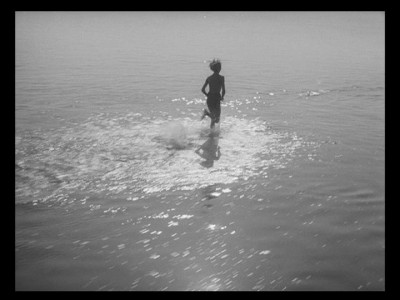
A bold, often visionary debut from Andrei Tarkovsky, the greatest, most revolutionary (albeit in a markedly different way) Russian filmmaker since Eisenstein, Ivan's Childhood takes a conventional war-story blueprint and makes a visually and aurally exquisite journey of it. The film is marked throughout with Tarkovsky's lyrical touches, which make the memories of its protagonist -- a Russian boy orphaned during WWII and determined both to do his duty for his country and to take revenge for his loss -- into vividly intoxicating dreams, and transform the child's military experiences in his war-ravaged homeland into a jarring nightmare, the smoky, grey-and-black, cruel spell of war broken by the film's impassioned performances and Tarkovsky's digressive camera consistently reminding us that nature -- water, fire, sun, rain, snow, fields, trees -- is a constant and resilient source of beauty despite the human tragedy and folly the Earth must always bemusedly tolerate. Tarkovsky's poetic POV has the contradictory but very salutary effect of at once putting 12-year-old Ivan's sad life and fate into perspective, and throwing it into relief; a childhood that should have, as we see in the beautifully filmed, hyper-real dream sequences based on his pre-war impressions of his life, seen him flowing in harmony with that natural beauty, will instead be forced to forge grimly and determinedly through it, his chance to be at one and at peace with the beautiful world around him just one of the unconscionably many casualties of any war, justified or not. Ivan's Childhood is easily the most conventional of Tarkovsky's films, but that's more to say that his later, even more stylistically daring and uncompromising pictures represented more exclusively and purely his own highly original vision than to imply that there's anything remotely dull or desultory about Ivan's Childhood. It remains a breathtaking, vital touchstone marking the exhilarating birth of a surpassingly gorgeous, contemplative, awed and awesome cinematic vision; the blinding, enrapturing light of the world as seen through Tarkovsky's camera eye already suffuses many patches of this first vessel which, though not perfected to its ne plus ultra, still allows us many a generous draught from the well of Tarkovsky's serenely searing imagination. Highly Recommended.
|
| Popular Reviews |
| Sponsored Links |
|
|
| Sponsored Links |
|
|
| Release List | Reviews | Shop | Newsletter | Forum | DVD Giveaways | Blu-Ray | Advertise |
|
Copyright 2024 DVDTalk.com All Rights Reserved. Legal Info, Privacy Policy, Terms of Use,
Manage Preferences,
Your Privacy Choices | |||||||









